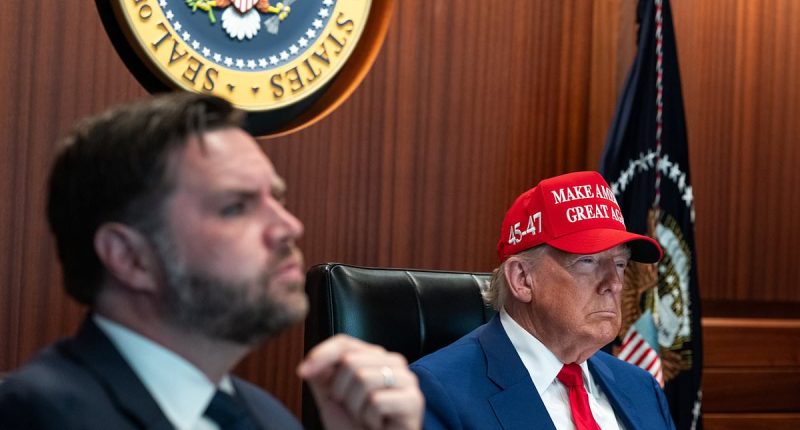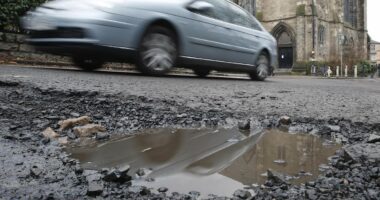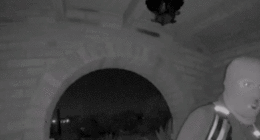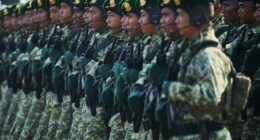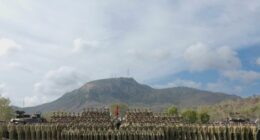Share this @internewscast.com
Iranian and Russian officials have been quick to assert that the U.S. strikes in Iran were ineffective.
During a Sunday morning press briefing, high-ranking Pentagon officials stated that the targeted sites had been ‘obliterated’ and ‘severely damaged,’ while an Iranian representative minimized the effects of the attack.
‘From Iran’s standpoint, there has been nothing particularly unexpected. Iran had anticipated an attack on Fordow for several nights,’ commented Mehdi Mohammadi, an advisor to the chairman of the Iranian parliament. ‘The site had been evacuated a while back and suffered no irreversible harm in the strike.’
In a bold nighttime mission named ‘Operation Midnight Hammer,’ U.S. B-2 stealth bombers, along with other aircraft and aided by U.S. submarine forces, launched missiles at three Iranian nuclear facilities.
Iran’s mountainous Fordow nuclear enrichment site was targeted by seven B-2 bombers that dropped 14 30,000-pound bunker buster bombs, officials said.
The head of the International Atomic Energy Agency, Rafael Grossi, said the degree of damage inside Iran’s enrichment falls ‘can’t be determined with certainty.’ ‘It could be important; it could be significant, but no one … neither us nor anybody else could be able to tell you how much it has been damaged,’ Grossi cautioned.

A U.S. B-2 bomber returns to an Air Force base in Missouri after striking Iran. Iranian officials have said the strikes did not yield ‘irreversible damage’

Ali Shamkhani, head of the Iranian nuclear program and senior advisor to Supreme Leader Khamenei, said Sunday, ‘Even if nuclear sites are destroyed, game isn’t over, enriched materials, indigenous knowledge, political will remain’

Dmitry Medvedev, (R) deputy head of the Kremlin’s powerful security council, and a former Russian president and prime minister, pictured with Vladimir Putin
But Russian officials soon repeated the claim that the sites only were partially impacted.
‘Critical infrastructure of the nuclear fuel cycle appears to have been unaffected or sustained only minor damage,’ Deputy Chair of the Security Council of the Russian Federation Dmitry Medvedev posted on X. ‘The enrichment of nuclear material — and, now we can say it outright, the future production of nuclear weapons — will continue.’
‘A number of countries are ready to directly supply Iran with their own nuclear warheads,’ he added.
Iranian officials are reportedly heading to Moscow to brief Kremlin officials on the extent of the U.S. strikes.
Game isn’t over…enriched materials, indigenous knowledge, political will remain.
Iranian Ayatollah Ali Khamenei
‘Even if nuclear sites are destroyed, game isn’t over, enriched materials, indigenous knowledge, political will remain,’ Ali Shamkhani, an adviser to Iran’s Supreme Leader Ayatollah Ali Khamenei, said Sunday.
The existing ‘enriched materials, local expertise and political will’ remain despite the strikes, he added.
Iran was originally struck by Israeli forces over a week ago, but Israeli officials said that U.S. bombs would be needed to completely disable the sites.
The U.S. was reportedly considering the strikes on Iran’s nuclear sites for days after Israel’s initial salvos.


President Donald Trump announced the successful strikes during a White House address on Saturday evening

A combination picture shows satellite images over Fordow underground complex, before and after the U.S. struck the underground nuclear facility, near Qom, Iran, June 20, 2025 (L) and June 22, 2025
This theoretically gave the Middle Eastern country some time to move important nuclear material and machinery before the U.S. stealth attack this weekend.
When asked by NBC’S Kristen Welker if he was confident that Iranian nuclear sites were completely destroyed, Vice President JD Vance hedged, saying the strikes ‘substantially delayed their development of a nuclear weapon.’
Since the attacks, the Department of Homeland Security has advised Americans that the U.S. homeland is now a potential target.
‘It is our duty to keep the nation safe and informed, especially during times of conflict,’ DHS Sec. Kristi Noem told the Daily Mail in a statement.
‘The ongoing Israel-Iran conflict brings the possibility of increased threat to the homeland in the form of possible cyberattacks, acts of violence, and antisemitic hate crimes.’
